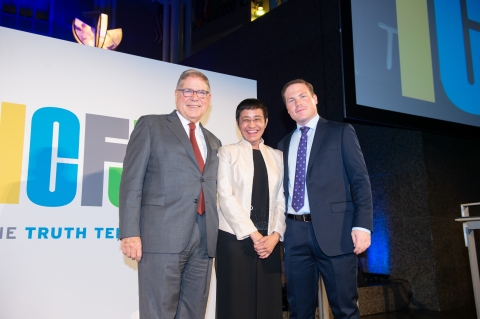
Each year, the International Center for Journalists honors outstanding colleagues with the Knight International Journalism Award at our annual gala in Washington, D.C. We’re now seeking nominees whose pioneering coverage or media innovations have made an impact on the lives of people in their countries or regions. Candidates can be reporters, editors, technologists, media managers, citizen journalists or bloggers. Please send in your nominations by Friday, March 1, 2019.
Our 2018 Knight Award winners were Maria Ressa, an intrepid editor and media innovator who has held a spotlight to the Philippine government’s bloody war on drugs, and Joseph Poliszuk, who has reported on high-level corruption in the midst of Venezuela's economic collapse. Both persist in their truth telling, despite harsh threats and lawsuits aimed at forcing them out of business.
The award reflects the mission of ICFJ's Knight Fellowships, which create and spread news innovation to better engage communities and improve lives. The program is supported by John S. and James L. Knight Foundation and the Bill & Melinda Gates Foundation.
The winners will be honored at ICFJ’s Awards Dinner in Washington, D.C., on Nov. 7, 2019.
For more information about the awards, please contact Natalie Van Hoozer at nvanhoozer@icfj.org. For information about the Awards Dinner, please contact Andria Moore at amoore@icfj.org.
Please help us celebrate the contributions of outstanding journalists by nominating someone today. Candidates who meet the awards criteria may nominate themselves.
You can find the nomination form here.